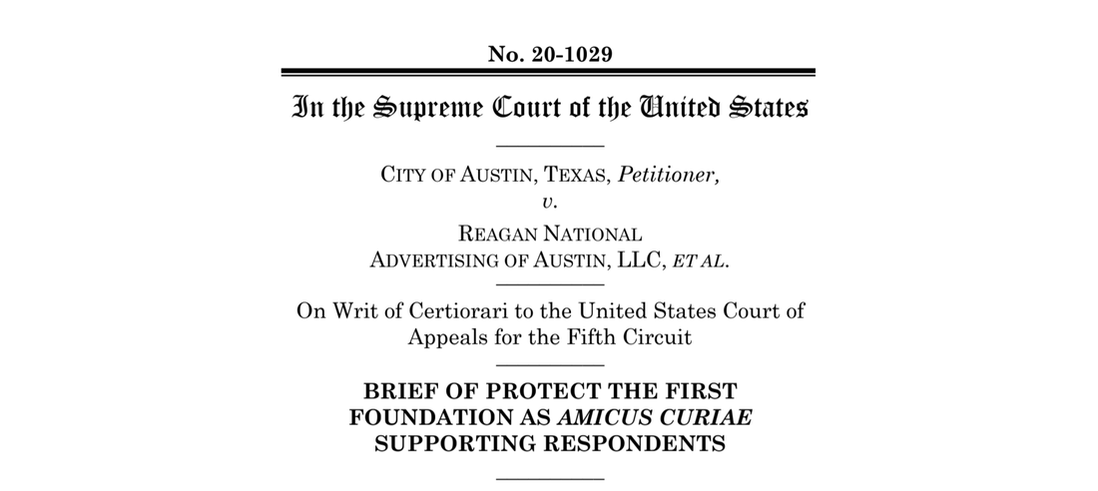|
When the U.S. Supreme Court heard oral argument last Wednesday in Austin, v. Reagan National Advertising, a case asking about the city of Austin’s restriction on billboards and signage, many of the Justices’ questions echoed themes advanced in the amicus brief filed by Protect The First Foundation.
Austin city code prohibits signs from displaying messages that advertise “a business, person, activity, goods, products or services not located where the sign was installed.” A sign cannot even direct people to another location. Such “off-premise” signs are forbidden, with allowance made only for older, grandfathered signs. Protect The First Foundation’s brief explained that regulations “that turn on the content of speech are particularly troubling and prone to abuse, even where they are not overtly based on the viewpoint of the restricted speech. Often, a content restriction is merely a proxy for viewpoint discrimination.” The Supreme Court unanimously reached a similar conclusion in 2015 in Reed v. Town of Gilbert, when it held that an Arizona town could not impose different restrictions on the display of temporary signs based on the messages they conveyed. The Fifth Circuit applied this logic to the Austin law and held that any time an officer must read a sign to apply the law, the law is content based and must meet exacting strict scrutiny under the First Amendment. Justice Clarence Thomas defined the issue in culinary terms, asking if Austin’s famous Franklin BBQ could post a sign at the restaurant, but could not post such a sign somewhere else. The attorney for Austin said that was the case under the city code. Justice Thomas pointedly asked if location-based regulation of speech is also a content-based distinction: “So, in other words, I can’t say certain things unless I’m at a certain location? I can’t say ‘Eat at Franklin’s’ unless I’m at Franklin’s?” Justice Brett Kavanaugh asked whether strict scrutiny would apply if the standards were content-based. He also asked whether, if the standards are not content-based, the weaker standard of intermediate scrutiny apply. Austin’s attorney agreed strict scrutiny would be tough for a signage regulation to meet and argued for intermediate scrutiny. Kannon Shanmugam, the attorney for Reagan National, a family-owned business in Austin, saw an opening. He said: “Under this Court’s decision in Reed, Austin’s distinction between signs advertising on-premises and off-premises activities is content-based … A through line of this Court’s First Amendment cases is that whatever the standard of review, a regulatory distinction between different types of speech has to bear some relation to the governmental interest asserted.” He then put forward an example of how content cannot be separated from Austin’s regulation: “[I]f you think about it from the perspective of the owner of the premises, that owner’s speech is being limited and plainly being limited on the basis of content … Let’s say you’re a church and you want to advertise the services that take place every Sunday on your premises. Of course, under Austin’s ordinances, you can do that. “But what you can’t do is to use your digital sign to advertise an interfaith service that might be taking place at the Jewish synagogue down the road. That is a limitation on the subject matter of your speech.” The Protect The First brief took an approach that was as broad as the synagogue example was specific. The brief compared the compromising of First Amendment rights in the Austin case to the compromising of the Fourteenth Amendment’s Equal Protection and Due Process Clauses in the landmark case Loving v. Virginia, which struck down restrictions on interracial marriage. That the substance of the content restriction depends upon the non-content fact of location, and varies with every location involved, does not make it content neutral any more than the restrictions on interracial marriage struck down in Loving were race-neutral because they applied to persons of any race and varied based on the race of their prospective spouse. From the oral argument, there is a significant chance the Court will agree with Protect The First Foundation that the Austin code is subject to and fails First Amendment strict scrutiny. But even if strict scrutiny does not apply, we demonstrated the code should fail even lesser scrutiny because the city has not identified any valid, specific and genuine government interest in limiting signs to messages about their specific location. Comments are closed.
|
Archives
June 2024
Categories
All
|
ABOUT |
ISSUES |
TAKE ACTION |



 RSS Feed
RSS Feed